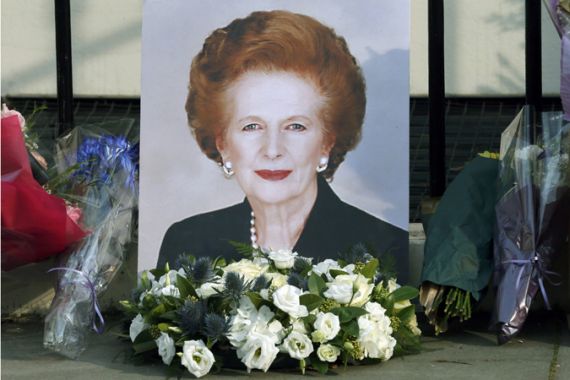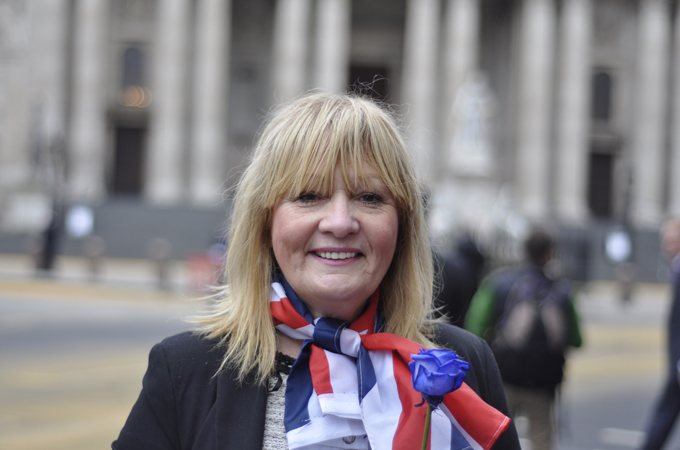London streets divided over Thatcher
While $15m funeral riles opponents, supporters fondly bid farewell to the former British prime minister.

London, United Kingdom – Bitter arguments over Margaret Thatcher’s divisive legacy continued on the streets of London even as the former British prime minister’s funeral cortege made its way to her final resting place.
Sympathetic crowds, many carrying union flags, gathered on the funeral route through the monumental heart of the capital from the early hours of Wednesday to pay tribute to the UK’s only female prime minister, whose leadership of the country from 1979 to 1990 is seen as pivotal in shaping modern Britain.
Preparations for the funeral had verged on the surreal amid concerns that protesters could attempt to disrupt an occasion that had provoked criticism over its scale and expense.
Westminster City Council said it had put nine flushing machines and 40 staff on standby in case protesters attempted to flood the route of the procession with milk; a reference to Thatcher’s abolition of free school milk when she was education secretary in the early 1970s.
Thatcher is still reviled in many parts of the country for the economic devastation that many blame on her government.
Protesters drowned out
Several hundred protesters massed a few hundred metres away from St. Paul’s Cathedral, where the funeral service took place, chanting “Maggie, Maggie, Maggie. Dead, dead, dead!”, and “What a waste of money!”
They whistled and booed as members of the armed forces paraded past, and then turned their backs on the coffin.
But their demonstration was drowned out by the cheers and applause of mourners who packed the streets, with many clambering on street furniture to catch a glimpse of the proceedings.
Jan Walters, a 58-year-old personal assistant from Rayleigh in Essex, had left home at 5:30am to secure a place on the railings near St. Paul’s.
 |
| Phil Passera, 37, from London said Thatcher’s legacy was ‘greed, corruption and destruction’ [Simon Hooper/Al Jazeera] |
“She was our first woman prime minister and she did more for the country than most. The unions had held this country to ransom since the Second World War and she took them on,” Walters told Al Jazeera.
Comparing Thatcher to Britain’s World War II leader, she added: “It’s rubbish what they’ve been saying about her, that she was evil. She was a great stateswoman and she is up there with Winston Churchill.”
Tim Fell, a 32-year-old student from Edinburgh, had travelled from the Scottish capital to pay his respects.
Thatcher is widely derided in Scotland for introducing the poll tax, the controversial flat-rate levy that triggered social unrest and eventually led to her downfall in 1990.
But Fell told Al Jazeera it was wrong to judge her legacy on one policy, conceding the poll tax was a result of someone holding too much power for too long.
“She has almost been turned into a Joan of Arc figure. She has become a myth that doesn’t reflect the Margaret Thatcher of the time, and I think it is important we use this occasion to undo some of the myths. A lot of the criticism of her is based on hyperbole and hearsay,” Fell said.
Economic transformation
From those with longer memories, there was recognition of the way Thatcher had transformed Britain after a decade of weak governments in the 1970s when strikes and power shortages had disrupted the economy, and the country had been forced to borrow from the International Monetary Fund to stay afloat.
Ian Walters, a 57-year-old office worker from Kent who voted for Thatcher in each of her election victories in 1979, 1983 and 1987, said she had turned the country from a “basket case” into a thriving economy.
“Suddenly this woman appears and within three or four years completely transformed people’s attitudes,” he told Al Jazeera. “Suddenly you felt proud to be British.”
Brian Bilverstone, 51, wearing the medals of a Royal Navy Falklands war veteran, paid tribute to Thatcher for her leadership during the 1982 conflict with Argentina over the disputed South Atlantic islands.
“Without her determination we would never have gone down there and British people who were being invaded and repressed would now be under the heal of a foreign government that they don’t want,” Bilverstone told Al Jazeera.
Joe Spiteri, originally from Gibraltar, the British territory at the tip of Spain, said he had admired Thatcher for her stance in defence of the UK’s overseas territories.
“She was very pro keeping [Gibraltar] British. She was one of the few prime ministers who stood up and said, ‘While I’m in power there will be no discussion on sovereignty unless the Gibraltarians wish it themselves,'” he told Al Jazeera.
“When the Falklands flared up, we thought we were going to be safe, because if she’s going to save the Falklands we’ll always be okay.”
 |
| Jan Walters, 59, from Essex, called the ‘Iron Lady’ ‘a great stateswoman’ [Simon Hooper/Al Jazeera] |
$15m funeral
But Claire Harris, a 33-year-old student in London, said the estimated $15m public cost of the funeral was outrageous.
“She is just another human being and there are people hungry and homeless in this country, hospitals being shut down, benefits being cut and it’s just disgusting,” Harris told Al Jazeera.
Originally from the north of England, Harris said she had grown up amid the economic devastation to the region caused by Thatcher’s policies, and especially her dismantling of the coal mining industry.
“How she affected the miners is close to my heart. She split communities and she promoted capitalist consumerism.”
Phil Passera, a 37-year-old musician, told Al Jazeera he was motivated to protest by his mother’s experience of working as a teacher under Thatcher when, he said, schools had been “run into the ground”.
“The Thatcher legacy is one of greed, corruption and destruction. My personal problem with her is that she did not believe in society. I believe that community and society are everything,” he said.
Phil Rowan and Sean Doyle, from Liverpool, displayed a banner reading “Justice for the 96”, a reference to the Liverpool football fans killed in the Hillsborough stadium disaster in 1989.
If you ask someone in 100 years to name two British prime ministers, it will always be Churchill and Thatcher.
An inquiry last year exposed police culpability in the tragedy and an official cover-up to blame it on the Liverpool supporters following a long campaign for justice led by families of the dead.
Doyle said Thatcher had stood by the police because of the support they had shown her in quelling the miners’ strike in 1984.
“It was a massive injustice. We were treated like lepers and we blame the government of the time. After the miners’ strike, Thatcher was never going to let the police take any blame for Hillsborough because they supported her so loyally,” Doyle told Al Jazeera.
Yet, for many, Thatcher’s capacity to provoke irreconcilable divisions of opinion, even more than two decades after she left office, merely reflect her strength of leadership and enduring influence in the country she shaped.
Spiteri, an antiques dealer specialising in political memorabilia, said she was second only to Churchill in her appeal to collectors.
“If you ask someone in 100 years to name two British prime ministers, it will always be Churchill and Thatcher. She was voted in three times by the British public and, for good or bad, she will always be remembered.”